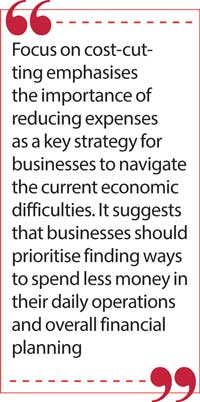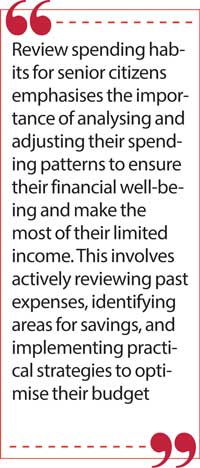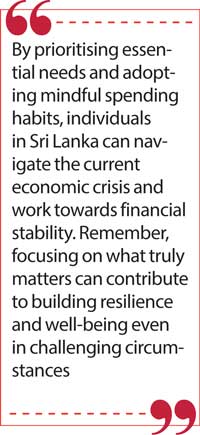Wednesday Feb 18, 2026
Wednesday Feb 18, 2026
Friday, 26 January 2024 00:25 - - {{hitsCtrl.values.hits}}

People struggle to make ends meet due to rising costs of living and high taxes
 Sri Lanka is currently facing a severe economic crisis, with many people struggling to make ends meet due to rising costs of living and high taxes. This is causing a strain on businesses, individuals, and senior citizens alike.
Sri Lanka is currently facing a severe economic crisis, with many people struggling to make ends meet due to rising costs of living and high taxes. This is causing a strain on businesses, individuals, and senior citizens alike.
Understanding the challenges
Several factors have contributed to Sri Lanka’s economic woes, including:
Strategies for businesses
Businesses in Sri Lanka are facing a tough environment, but there are steps they can take to adapt and survive:
“Focus on cost-cutting” emphasises the importance of reducing expenses as a key strategy for businesses to navigate the current economic difficulties. It suggests that businesses should prioritise finding ways to spend less money in their daily operations and overall financial planning.
 Here’s a breakdown of the meaning in different contexts:
Here’s a breakdown of the meaning in different contexts:
Therefore, “Focus on cost-cutting” highlights a potential response to the economic challenges but also carries potential consequences beyond individual businesses.
Here are some examples of how businesses can embrace technology to cut costs:
Cloud computing:
 Automation:
Automation:
Data analytics:
Machine learning:
Collaboration tools:
These are a few examples of how businesses can embrace technology to cut costs. There are many other ways that technology can be used to improve efficiency and productivity that lead to cost savings.
It is important to note that embracing technology is not a one-size-fits-all solution for cost-cutting. Businesses need to carefully consider their specific needs and budget before investing in any new technology. However, when used strategically, technology can be a powerful tool to help businesses save money and improve their bottom line.
Strategies for individuals
Individuals in Sri Lanka can also take steps to manage their finances during this challenging time:
The phrase “Prioritise essential needs” emphasises the importance of focusing on spending on the most crucial items for survival and well-being. This means allocating limited resources carefully to ensure basic necessities are met before considering non-essential purchases.
Here are some typical examples of essential needs for Sri Lankans to prioritise, considering the current economic situation:
Food: Securing sufficient nutritious food to maintain health and energy should be the top priority. This may involve buying staples like rice, lentils, and vegetables in bulk, and opting for more affordable protein sources like beans and fish.
Remember, these are just general examples, and specific needs may vary depending on individual circumstances, family size, and location.
Here are some additional tips for prioritising essential needs in Sri Lanka:
 Create a budget: Track income and expenses to understand where your money goes and identify areas where you can cut back.
Create a budget: Track income and expenses to understand where your money goes and identify areas where you can cut back.
By prioritising essential needs and adopting mindful spending habits, individuals in Sri Lanka can navigate the current economic crisis and work towards financial stability. Remember, focusing on what truly matters can contribute to building resilience and well-being even in challenging circumstances.
“Reduce debt” emphasises the importance of minimising outstanding loans and liabilities to improve financial stability and manage monthly expenses more effectively. This requires strategic actions to lessen the burden of existing debt and prevent further accumulation.
Here are some typical examples of “reducing debt” suitable for Sri Lankans:
1. Prioritise high-interest loans: Focus on paying off loans with the highest interest rates first. These typically include credit card debt, personal loans, and payday loans. High-interest rates accumulate quickly, hindering financial progress.
2. Negotiate debt consolidation: Talk to your lenders about consolidating multiple smaller loans into a single loan with a lower interest rate. This can simplify your payments and potentially reduce the overall interest paid.
3. Utilise Government assistance: Certain Government programs in Sri Lanka might offer debt relief initiatives or financial assistance for low-income individuals struggling with debt. Explore eligibility for such programs.
4. Implement alternative payment plans: Negotiate with lenders to extend repayment periods or arrange smaller, more manageable monthly payments. This can provide temporary relief and prevent defaulting on loans.
5. Refinance loans: If interest rates have fallen since you acquired a loan, consider refinancing to a lower rate that can reduce your monthly payments and total interest paid.
6. Avoid new debt: Resist the urge to take additional loans during this challenging financial period. Prioritise saving and living within your means to avoid further debt accumulation.
7. Sell non-essential assets: Consider selling belongings you no longer need or use to generate cash and pay down debt. This could be a temporary measure to free up some financial resources.
8. Increase income: Explore ways to increase your income through freelancing, side hustles, or finding a higher-paying job. Additional income can be used to make larger debt payments.
9. Seek financial counseling: Non-profit organisations or Government agencies in Sri Lanka might offer financial counseling services. These professionals can provide personalised guidance and strategies for managing debt effectively.
Remember, reducing debt is a gradual process requiring discipline and commitment. Celebrate small victories along the way and stay motivated by focusing on the long-term benefits of achieving financial freedom.
By implementing these strategies and seeking support when needed, individuals in Sri Lanka can take control of their debt and navigate the current economic difficulties with greater financial stability and peace of mind.
Strategies for senior citizens
Senior citizens in Sri Lanka are particularly vulnerable to the effects of the economic crisis, as they may have fixed incomes that do not keep up with inflation. Here are some steps they can take to protect their finances:
“Review spending habits” for senior citizens emphasises the importance of analysing and adjusting their spending patterns to ensure their financial well-being and make the most of their limited income. This involves actively reviewing past expenses, identifying areas for savings, and implementing practical strategies to optimise their budget.
Here are some examples of reviewing spending habits for senior citizens in Sri Lanka:
1. Track expenses: Maintaining a record of daily, weekly, or monthly expenses for a reasonable period helps identify spending patterns and potential areas for cutbacks. Utilise a simple notebook, spreadsheet, or mobile app to track expenses easily.
2. Categorise expenses: Divide expenses into essential categories like food, housing, healthcare, utilities, and transportation. This categorisation helps visualise where the bulk of the money goes and prioritise essential spending.
3. Identify non-essential costs: Analyse each category and identify non-essential expenses that can be reduced or eliminated. This could include subscriptions, entertainment expenditures, impulse purchases, or dining out frequently.
4. Negotiate bills: Contact service providers like phone or internet companies to negotiate lower rates or seek senior citizen discounts offered by some businesses.
5. Utilise cost-saving measures: Explore Government-subsidised options for essential needs like food and healthcare. Attend free community events or utilise public libraries for entertainment instead of paid options.
6. Cook at home: Prepare meals at home using affordable ingredients like lentils, vegetables, and local fish to save significantly compared to eating out or relying on processed foods.
7. Consider alternative transportation: Utilise public transportation like buses or trains for essential travel instead of relying on taxis or private vehicles. Walking or cycling for short distances could further reduce transportation costs.
8. Barter or share resources: Consider bartering skills or homemade goods with neighbours or friends for items you need. Sharing resources like gardening tools or household supplies with trusted individuals can reduce individual expenses.
9. Seek family support: Open communication with family members could help identify shared needs and explore ways to support each other financially. Consider living arrangements or shared meal plans to optimise resources.
Utilise senior citizen assistance programs: Explore Government programs or non-profit organisations offering financial assistance, subsidised services, or social support specifically for senior citizens in Sri Lanka. Seniors in Sri Lanka are eligible for a number of Government benefits, such as pension payments and subsidised healthcare.
Remember, reviewing spending habits is an ongoing process, not a one-time event. Regularly reassess your budget, adapt to changing circumstances, and do not hesitate to seek help from family, friends, or community resources when needed.
By actively reviewing and adjusting their spending habits, senior citizens in Sri Lanka can navigate the economic crisis with greater financial security and maintain a good quality of life.
For senior citizens in Sri Lanka facing the current economic crisis, “Talk to family and friends” emphasises the importance of open communication and social support as valuable resources for coping with financial difficulties and maintaining emotional well-being.
Here are some examples of how talking to family and friends can benefit senior citizens in Sri Lanka:
10.Sharing concerns and seeking advice: Openly discussing financial worries and challenges with trusted family members or friends can provide emotional support and potentially lead to helpful advice or suggestions based on their own experiences.
11.Exploring support options: Family and friends might be aware of Government assistance programs, subsidised services, or local charities specifically catering to senior citizens facing financial hardship.
12.Identifying shared needs and resources: Discussing needs with loved ones can help identify areas where resources can be shared or combined, like shared meal plans, childcare arrangements, or transportation.
13.Reducing social isolation: Social interaction and emotional support from family and friends can combat feelings of loneliness and isolation often associated with financial difficulties, especially for senior citizens living alone.
14.Planning and decision-making: Talking through options and challenges with loved ones can provide different perspectives and aid in making informed decisions regarding living arrangements, financial management, or seeking additional support.
15.Fostering a sense of community: Regular communication and shared activities with family and friends can create a sense of belonging and community that can be crucial for mental and emotional well-being during challenging times.
Here are some additional tips for effective communication:
Remember, talking to family and friends is not a sign of weakness, but a display of strength and willingness to seek support during difficult times. Open communication and strong social connections can be invaluable assets for senior citizens in Sri Lanka navigating the economic crisis and maintaining a good quality of life.
The Sri Lankan Government is also taking steps to address the crisis, such as by seeking International Monetary Fund assistance and restructuring debt. However, it is likely to take some time before the economy recovers.
It is important to note that the economic crisis is a complex issue with no easy solutions. The strategies mentioned above are just a starting point, and it is likely that more will need to be done to help Sri Lanka recover.
(The writer is Managing Partner at A.G. Sarma&Co., (CA) Chartered Accountant, and Tax and Management Consultant. He can be reached via email: [email protected].)